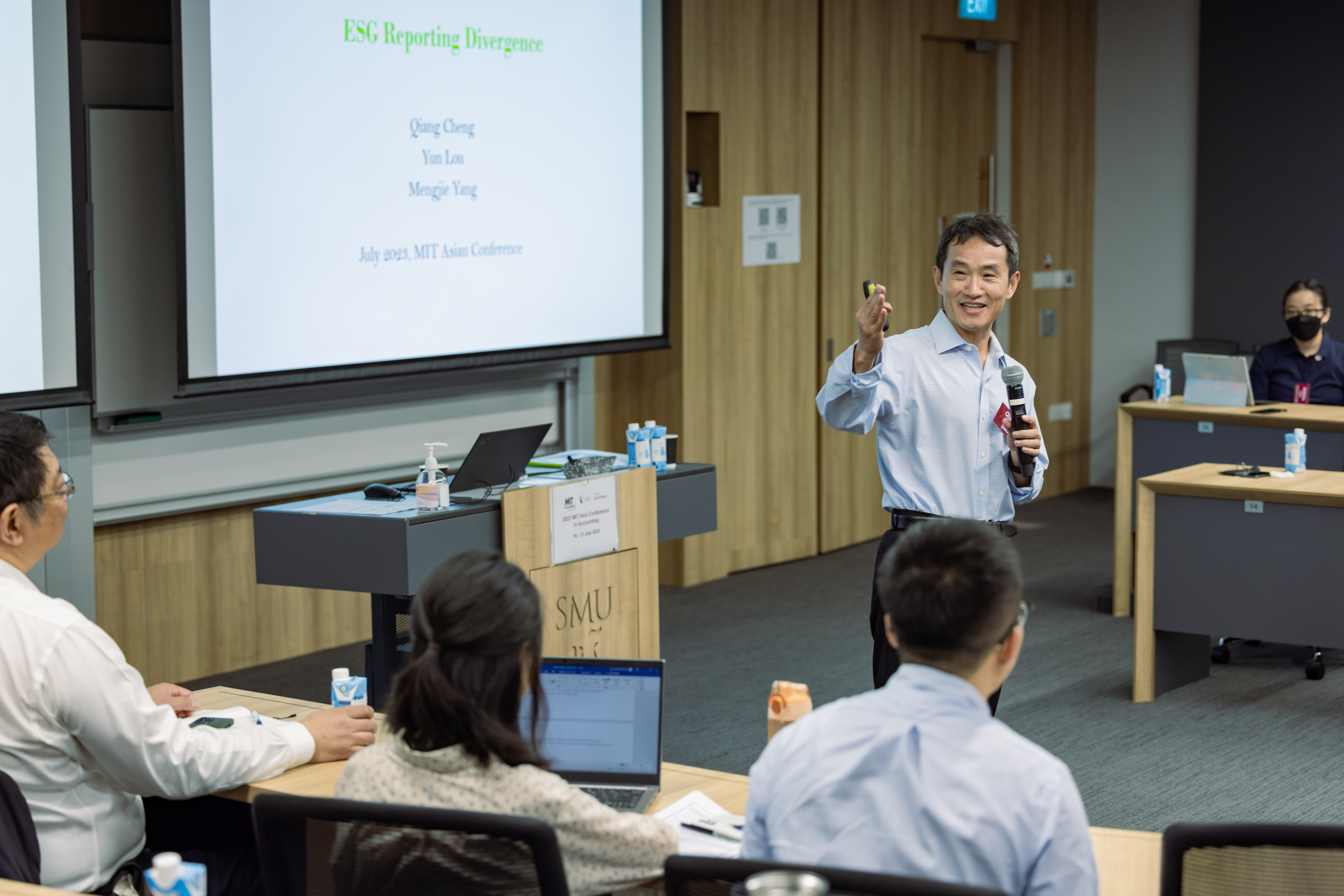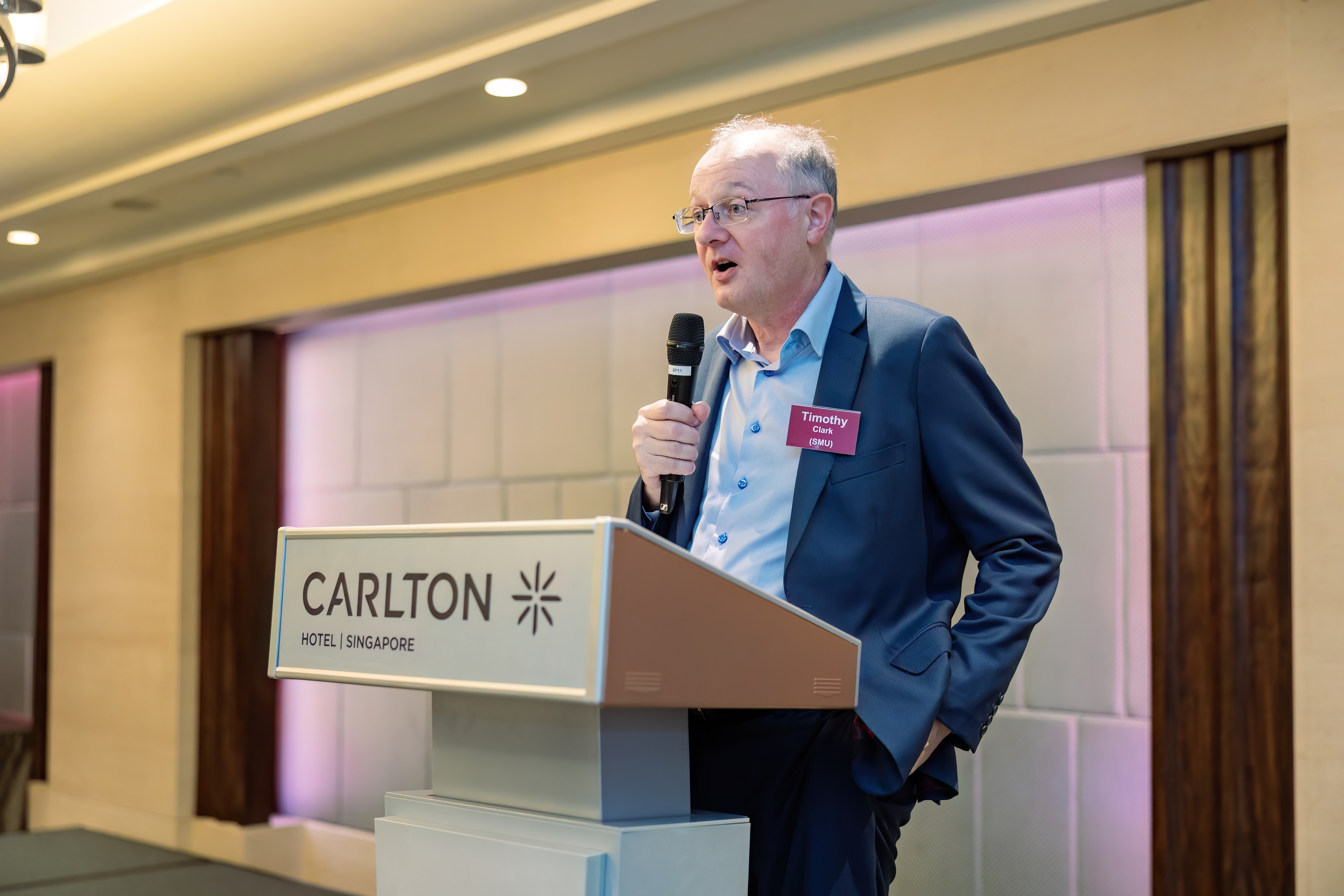MIT Asia Conference in Accounting 2023
MIT Asia Conference in Accounting 2023
With the increasingly complex and interconnected world, the concept of disclosure is one that holds significance. It is vital for transparency and helps businesses remain accountable to their stakeholders, while also allowing stakeholders to make informed decisions.
Despite its inherent benefits, disclosure can have negative ramifications. Excessive disclosure can result in information overload that drowns out facts of importance, and bad actors who selectively disclose information can create a false narrative.
It is precisely this complex nature that makes the subject of disclosure a fascinating one for study, as academics strive to understand the way disclosure affects businesses and their relationships with their stakeholders. This could clearly be observed at the recent MIT Asia Conference in Accounting, where more than a third of the papers presented looked at disclosure in different domains, including environmental, social, and governance (ESG) issues.
The conference was held at Singapore Management University from 10 to 11 July 2023 – the first time that it has been hosted in the city-state. Before the start of conference, PhD Students also seized the opportunity to interact with leading teachers, researchers, and their peers in a Doctoral Consortium held on 9 July 2023.
“We are proud to be the first institution to host the Conference here. This is an important milestone for SMU School of Accountancy as it seeks to be Asia’s leading accounting school in thought leadership,” said Lee Kong Chian Professor of Accounting Zhang Liandong, Deputy Dean of the SMU School of Accountancy.
A total of 170 academics and practitioners of accounting and corporate governance in the Asia-Pacific region, North America, Europe and beyond came together to discuss relevant research in the field during two-day conference. In its six sessions, 36 papers in subjects such as tax, voluntary disclosures, ESG disclosures, bond markets and more, were presented and discussed. A total of five papers from SMU were selected to be presented at the conference, with one of the papers clinching the Best Paper award.
The strengths of voluntary disclosure within an environment built on transparency
Amanda Aw Yong receiving her Best Paper Award
“The Role of Disclosure in DeFi Markets: Evidence from Twitter”, authored by Dr Amanda Aw Yong, an SMU PhD in Accounting graduate, clinched Best Paper Award at the Conference.
Based on her dissertation which she completed at SMU, the paper looked at whether voluntary disclosure of blockchain information affects Decentralised Finance (DeFi) markets.
Used as an umbrella term for financial services on public blockchains, DeFi is an emerging financial technology that, unlike centralised financial institutions like banks and brokerages, eliminates the intermediaries, and allows people and businesses to directly conduct financial transactions anywhere they are – as long as they have an internet connection.
This means that DeFi can help to reduce transaction times and increase access to financial services. One of the main draws of DeFi is that it eliminates the fees that are often associated with using your credit card or other bank services and allows individuals to hold money in a secure digital wallet.
However, as an emerging technology, the infrastructure for DeFi and its regulation are constantly evolving. While the promised transparency and innovation meant that DeFi platforms grew tremendously in popularity, from US$9.1 billion in June 2020 to US$86.6 billion in February 2022, Dr Aw Yong also notes that this exponential growth is marred by substantial financial losses in a field with little regulation and rife with scams.
In her paper, Dr Aw Yong notes that an estimated $2.2 billion was stolen from DeFi platforms in 2021, most of which occurred when bad actors exploited errors in the smart-contract code that many DeFi platforms operate on.
While it might seem counterintuitive to discuss disclosure with regards to a technology that promises complete transparency, transaction-level data that is posted on the blockchain requires huge amounts of computing power and advanced-programming skills to process, thus making it inaccessible for less-savvy DeFi users.
As such, summarised blockchain-related disclosure can help users process the information more easily, which can help users understand how trusted a platform is, potentially encouraging them to come onboard the platform. This information is often shared on the platform’s Twitter account.
During her research, Dr Aw Yong found that voluntary disclosure of blockchain information on Twitter results in an increase in the platform’s Total Value Locked (TVL) and unique number of users. Furthermore, when tweets provide more information, there is a stronger effect.
These results provide an understanding of the current information environment of DeFi markets, which Dr Aw Yong thinks will be useful for regulators who are looking at how to design disclosure regulation within DeFi markets.
“I am delighted that my paper received recognition from the MIT Asia community. It is my hope that more accounting and finance researchers will invest time in helping us understand this alternative ecosystem [DeFi] and how it can fit into the existing economy,” shares Dr Aw Yong.
“Since this paper is based on my dissertation completed at SMU, this award is testament to the invaluable mentorship that the SOA faculty has so generously given over the past five years.”
The effect of disclosures on an organisation’s supply chains
During the first concurrent session, Associate Professor of Accounting Holly Yang from the SMU School of Accountancy presented her paper, “Corporate Disclosures for Green Supply Chains: Evidence from Scope 3 Emissions Disclosure”. The paper was co-authored with Associate Professor of Accounting Cho Young Jun, Assistant Professor of Accounting Kim Jungbae and PhD in Accounting student Yang Mengjie, all from the SMU School of Accountancy (SOA).
The paper sought to understand the role of corporate disclosures in greening supply chains – specifically, whether Scope 3 emissions disclosures can be used to reduce an organisation’s carbon emissions. Scope 3 emissions are those that are not produced by the organisation directly and are not the result of activities from assets that are either owned or controlled by them.
The results of Prof Yang’s study suggest that mandating the disclosure of Scope 3 emissions information will help to reduce the emissions of greenhouse gases.
“A customer’s Scope 3 emissions disclosure can motivate its supplier to reduce the emissions of greenhouse gases,” she says. “And the effect is greater when the supplier poses a greater climate risk for their customers, when the customer has higher bargaining power, and when the customer and supplier have stronger economic ties.
“Our study informs regulators and policymakers currently considering whether and how to mandate climate-related disclosures.”
Understanding the impact of ESG reporting divergence

Prof Cheng Qiang presenting on the topic of ESG reporting divergence and its consequences
Another SMU paper related to research in sustainability was Lee Kong Chian Chair Professor of Accounting Cheng Qiang’s paper, titled “ESG Reporting Divergence”. Co-authored with Associate Professor of Accounting Lou Yun and Ms Yang Mengjie, the paper investigated the consequences that ESG reporting divergence has.
With the array of different reporting frameworks that are in use, there can be inconsistencies in certain reported information – for example, carbon-monoxide emissions are not reported under certain frameworks. Where certain disclosures are not mandated, companies can also choose what they want to disclose, which makes it difficult for users to compare these firms with their peers.
The study found that ESG reporting divergence results in more ESG-rating disagreements between rating providers like Sustainalytics, MSCI and Bloomberg. Additionally, this divergence increases the costs associated with processing ESG information and makes the information less useful to ESG-rating providers and fund managers.
“These results can be useful for regulators who are creating policies on ESG reporting and provides strong empirical support for recent initiatives from organisations like the International Sustainability Standards Board (ISSB),” explains Prof Cheng.
Environmental regulations as an inducer of innovation
During the third concurrent session of the conference, Assistant Professor of Accounting Grace Fan presented her paper, titled “Going Green: The Effect of Environmental Regulations on Firms”. Co-authored by Assistant Professor Xi Wu from the University of California, Berkeley, the paper studied the effect that environmental regulations have had on firm valuations.
While there exists a belief that environmental regulations impose costs that drive down the productivity of regulated firms, previous research had argued that stricter environmental policies can lead to innovations and sustainable business practices that, in fact, reduce energy costs and operational efficiencies, especially in terms of long-term gains.
The findings from this study support this argument, showing that stricter environmental regulations are associated with an improvement in firm value. This improvement in value is a result of the introduction of green innovations, as well as the increased R&D performance of regulated firms.
“These findings are consistent with the idea that stricter environmental regulations can serve as an external governance mechanism to induce value-enhancing green investment,” says Prof Fan.
“These results contribute to the current policy debate about the economic affect of environmental regulations. While there is an argument that such regulations may impose an excessive burden on firms, our findings suggest that effectively designed environmental regulations can promote innovations that ultimately benefit firms, a consideration that can help guide future policymaking.”
How misinformation regulation affects the social-media sphere
The final paper from SMU was presented by Associate Professor of Accounting Lou Yun Co-authored with Assistant Professors of Accounting Richard Crowley and Samuel Tan, as well as Lee Kong Chian Professor of Accounting Zhang Liandong, the paper, titled “Misinformation Regulations: Early Evidence on Corporate Social-Media Strategy”, looked at how corporate social-media strategy has been affected by regulations that have been put in place to counteract the spread of misinformation.
Examples of regulations that counter the spread of misinformation include regulations such as the Protection from Online Falsehoods and Manipulation Act (POFMA) in Singapore. Since being passed in May 2019, POFMA has been used to counteract misinformation more than 30 times, including 19 times to correct COVID-19 misinformation.
“The digital transformation of media and the emergence of social media has changed how news is disseminated and the information dynamics of capital markets,” explains Prof Lou.
“However, the proliferation of misinformation threatens the healthy development of the digital-media market and the stability of capital markets.”
The paper showed evidence that the regulations to counter misinformation that have been passed in recent years have been beneficial for investors, and even help to reduce firms’ crash risks. When misinformation regulations reduce the threat of misinformation, it becomes less necessary for firms to use social media to mitigate the adverse effect of misinformation by publishing clarifying or pre-emptive tweets on Twitter.
On the other hand, such regulations also increase investor trust in social media, meaning that companies can use social media to disclose certain information.
Following a day of meaningful discussions about the papers that were presented, the first day of the conference was rounded-off with a conference dinner.
In his speech at the conference dinner, SMU Provost Professor Timothy Clark welcomed attendees, and thanked MIT Asia for entrusting SMU with co-organising the prestigious conference.
“It is a tremendous testament to the trust and recognition we’ve earned as a leading institution in education and research on accounting,” said Prof Clark.
He observed that many of the conference papers over the two-day conference shared themes related to SMU’s three strategic priorities of digital transformation, sustainable living, and growth in Asia, and elaborated upon the progress that SMU has made in each of these areas.
Ending his speech, Prof Clark once again welcomed attendees to the conference and to SMU, and bade them a fruitful conference for the remainder of the presentations.
“I wish you a very productive conference, full of informed presentations and inspiring conversations.”

Provost Delivering his Address at the Gala Dinner
Click here to view the full MIT Asia Conference in Accounting 2023 programme.